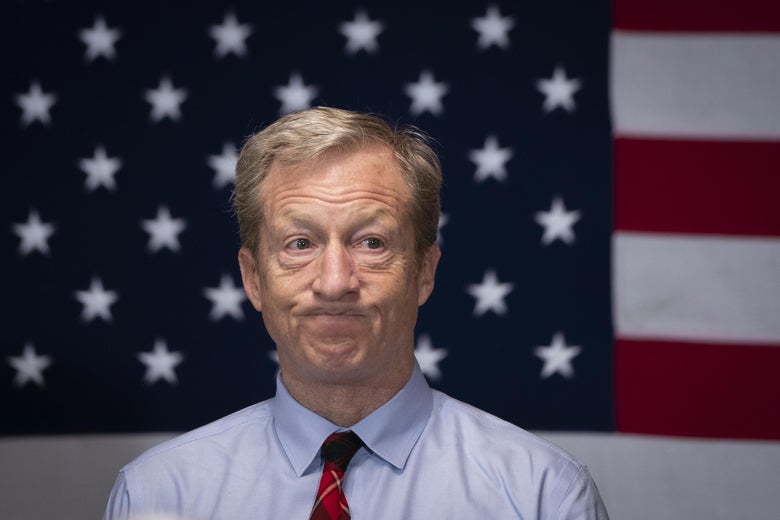
Tom Steyer and Juvenile. How did we get here?
Jim Newell
COLUMBIA, South Carolina—It took about one lap around the room at Tom Steyer’s closing South Carolina rally on Friday to figure out what was going on with his entire campaign.
Inside the gymnasium at Columbia’s Allen University, a historically black university, was a light show with hip-hop and R&B blasting. A few people were milling around, some were dancing, but most were just outside the gym, enjoying the catered spread the billionaire’s campaign has provided. There was a cheese, fruit, and charcuterie station; pulled pork paninis; brisket; and a full potato bar. The gym was about equally divided among press space, dining tables, two stages, and an open area. A couple hundred or so people would ultimately show up for this rally in a space that could have fit significantly more.
The overabundance told the story: To the extent that Steyer has been successful in South Carolina, it’s because he’s devoted not just his time to the state, but his bank account as well. He’s spent tens of millions of dollars on television advertisements and donated more to state party organizations. He’s been fielding accusations of buying off support, including by putting influential black lawmakers on his payroll. All of the, er, work was successful in earning him a foothold in state polls, but he’s ticked down in the last week as Joe Biden—the main figure from whom he was drawing supporters away—has risen anew. Saturday’s primary will be the final determinant of whether it was all a house of cards.
Of those with whom I spoke on Friday, few knew for certain that they would commit to Steyer. Larry Palmer, from Columbia, had two kids in college and wanted to hear more about Steyer’s plan for student debt relief. But he still had strong affection for Biden, and just wanted to be sure that he would pick a younger running mate to balance out the ticket. The Biden endorsement from Rep. Jim Clyburn, the patriarch of South Carolina Democratic politics, earlier in the week was “a strong thing to me,” Palmer said.
Alonzo Julian, a student at Allen University, described himself as a “stickler for HBCUs” and appreciated Steyer’s plan to invest in them—but was torn between him and Elizabeth Warren, who has her own HBCU plan. Trevor Stanley, a student at nearby Benedict College, said he was still choosing between Steyer and Bernie Sanders, but the latter had the edge.
“Tom’s got some good ideas, but Bernie?” Stanley said. “See, I like weed, so Bernie, he said he’s going to legalize weed.” It wasn’t just that: He also appreciated Sanders’ plan to eliminate student loan debt. “I mean, if it’s tomorrow, I’ll vote for Bernie tomorrow,” he said. “But if I had a couple more days, Tom’s got some good ideas.” He wouldn’t have a couple more days.
The campaign brought in talent for this last event: gospel star Yolanda Adams, DJ Jazzy Jeff (famed, to a certain generation, for his erstwhile partnership with Will Smith), and rapper Juvenile, most famous for his 1998 hit “Back That Azz Up.” They, in turn, were introduced by a series of endorsers including Greenwood City Councilwoman Edith Childs, the famous coiner of the Obama campaign’s “Fired up! Ready to go!” call-and-response. She had repurposed the slogan for this campaign, and led a lukewarm crowd in a chant of “Steyer’d up! Ready to go!”
The program ran into some hiccups. After a lengthy sound-check, Juvenile came on stage and was not—not—pleased with the way he sounded, consistently stopping the music to adjust sound levels. Eventually, after complaining that the sound was “getting worse by the minute” and questioning whether the sound guy had run off to a bar, he left the stage. (“That whole mess was NOT me,” I overheard the sound guy saying to a harried campaign staffer.) Yolanda Adams came out next and was met with a flood of requests that she could not meet.
“These were the two songs that were requested,” Adams said, “so I’m going to sing them, okay?” She began a rendition of “America the Beautiful.”
Steyer, himself, spoke for only about ten minutes at his expensive, technically challenged dinner theater, to an only marginally Steyer’d-up crowd that was more curious about whether Juvenile had left the building than about what the would-bre president’s closing pitch would be. Steyer had been, he observed, the candidate who’d spent the most time in South Carolina—time not being the only thing he had spent the most of—and said that “win, lose, or draw, I fell in love with the people of South Carolina.”
“I’m never leaving,” he said.
He closed out his speech with his best effort at an “I believe that we will win!” call-and-response, and exited the last event of the South Carolina primary—if not, depending on how Saturday goes, the final event of his campaign.
Or so it appeared. A short while later, after a DJ set by Jazzy Jeff, we found out that Juvenile had not left the building. And Tom Steyer hadn’t, either. A cruel fate insisted upon what ensued.
“Back that vote up!” Juvenile said.
And they were off.
Readers like you make our work possible. Help us continue to provide the reporting, commentary and criticism you won’t find anywhere else.
Join Slate Plusfrom Slate Magazine https://ift.tt/2weeV3y
via IFTTT
沒有留言:
張貼留言